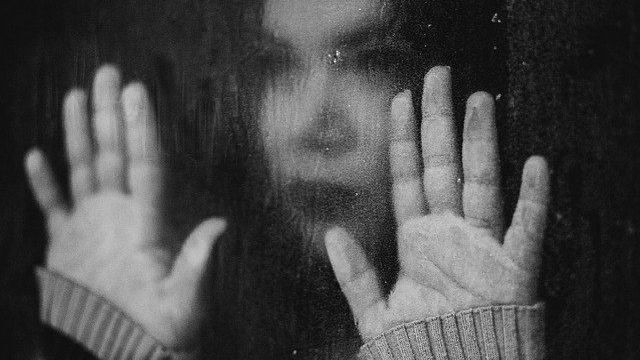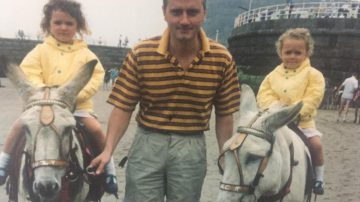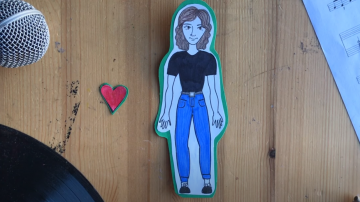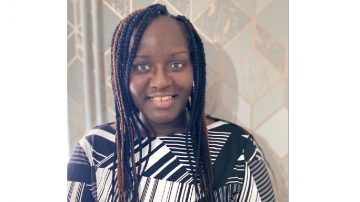Leigh’s story
Age: 29
I have had mental health issues probably since my early teens but it went undiagnosed for quite a while and then I was diagnosed with borderline personality disorder about 4 years ago. I am also in the middle of an official diagnosis for Autism. I moved to Sheffield about six years ago and I was doing fine about a year but had physical injuries that affected my joints and that’s a big part of my journey in Sheffield.
I was put in a borderline personality support group and it was good but too short. Something as life changing as a borderline diagnosis can’t be dealt with by attending only 4 or 5 weeks one hour session. So apart from the initial psychiatric diagnosis there wasn’t that much peer support. There are online support groups but they are not Sheffield specific and when you finish with that group you are offered other groups which are not massive support for people with borderline disorder.
I think using the right mental health services at the right time can be a huge factor. For example, I’ve been through Short Term Educational Program group (STEP) twice but I was in a really bad place and it really didn’t work for me and it didn’t have an impact. I had all these techniques to calm me down but because I had underlying issues and I was in a constant cycle of having a lot of panics, STEP didn’t help me. I say it in the nicest possible way that I did challenge them because it was more geared toward neurotypical people with very basic needs—don’t want to say basic because people go through things differently—but maybe less complex needs. I understand it is a broad one size fits all but I wish there was more knowledge and options in those groups. For example, if you are not ok with this then try this and that. The adaptability is what I like to see, everyone is different obviously, but there are enough people who have complex needs and need more accessibility. I know everything they do is coming from a great place, but it’s lack of knowledge and not knowing what to do. Their training systems need to improve.
During the past years I have been in A&E twice (you don’t want to go to A&E) or more and I have spoken to out of hours services quite a lot. I have also done CBT (Cognitive Behavioural Therapy).
Some of the worst experiences I had was with community mental health team (out of hours team). I rang them several times and it wasn’t a good experience. Every time you are given the same advice and the training they have been given is the only thing they can offer. When you call them you have passed the point of having a cup of tea in the bath! I don’t want to say it was dehumanizing, but infantilizing, because I was like if I’m calling you I have tried all my things that might have been helpful. So there is this number you can call out of hours but they are not really going to give you anything. I was told if I was a danger to myself I had to go to A&E and I was in a strange position—looking back it is a strange position that a lot of people experience that. I was not at that point yet to harm myself and I asked for help because I didn’t want to get to that point, but I was told to do the same basic self-soothe stuff that I already knew.
If I was told ‘you are in a really bad place and we set you an appointment to talk to someone tomorrow’ that would have been good instead of saying ‘call us back if you feel worse’ and again giving me the same advice. So it’s either doing the self-soothing box or going to A&E. In between there is a grey area and a lot of people with mental health issues are in that grey area for a long time. We need help at that stage— in that grey middle area— because we don’t want to get to the point of harming ourselves. It’s like you are ok and can manage, or you are in complete crisis and have to go to A&E. There is no acknowledgement for that pre-crisis area. Out of hour services need to be more proactive like ‘ok we’ll arrange for someone to ring you up and sign post you and provide help before we reach to the point of ending up in A&E’. It wasn’t a great experience. I have decided to avoid them because of that experience.
It really matters that you feel there is any other thing, more than the things you already know, that could help. You don’t want to be told to do things that you have already tried. When all my usual self-care things are not working it means I need additional support. Also if there is any additional support it’s not personally tailored.
They make you feel it’s not the system which has problems but it’s the user and that’s not helpful. Their training doesn’t really help to deal with people in crisis. I tried to tell them that, I don’t know if I got my point across very well or not; when you are in a crisis state you are not intelligently talking to people.
Surprisingly, the turning point for me was when I went through Pain Services for my chronic joint pain and they had a psychiatrist there who was very good. She introduced me to a model of therapy called Compassion-based Therapy and it really helped me. I really liked her and could fully open up to her, I could speak about stuff that happened in my childhood that affected me which made me insecure about a lot of things in my life. Instead of trying telling me you have to be positive and think positively and your problems go away, the Compassion-based Therapy helped me to treat myself with the same kind of compassion that I would do for anyone else. It’s intrinsically linked to helping people who are having intrusive thoughts. When you get a thought that ‘oh that’s bad’ you get to see how that is bad. I had a lot of self-negative thoughts and instead of telling me ‘oh you are amazing, you are great’, it was like you are trying your best and understand yourself from different perspectives as a whole picture. So this therapy came from the Pain Clinic, not mental health services. The psychiatrist there was working with a lot of people who blamed themselves because of their chronic pain. She understood where it’s coming from and helped me to realise the whole picture and that was a great experience and as I said a turning point.
Also it was at that time that I was told Autism might be an underlying thing for my depression and anxiety because it flares up those symptoms. In some support groups, I met a lot of women who also had similar conditions and had gone completely undiagnosed for years and years. There is a link with people who have chronic anxiety, borderline, and Autism especially with women. It is a long dark area where they have to go through so many stages of getting an official diagnosis. From my understanding, a lot of people present with borderline because of undiagnosed Autism and they have borderline because of it.
They now try to acknowledge that borderline is a trauma-based diagnosis but there isn’t much support out there and it causes a lot of mental health problems. You have to wait for a year for an official Autism diagnosis. I am now under Sheffield Adult Autism and I was in the middle of official diagnosis but it’s on hold because of coronavirus. I have no idea when I get my next appointment.
I have been living my life as if this [Autism] has been the factor and the diagnosis helps me to explain and answer all the whys behind my anxiety—why I get anxious because of everything. That’s a huge thing for me and it has been a massive mental journey for me in the last year.
I have got a bit of my mobility back. I have gone from being pretty much wheelchair bound, and then on crutches, to walking and that’s a huge factor and I am now volunteering with Disability Sheffield. Part of having Autism is getting bad anxiety attacks and I try to walk instead of bottling it up and be like, ‘I am 29 and I should be doing this and doing that’, just the acceptance of being different is helpful. People deal with things in different ways. I am very anti ‘you lose weight and exercise and your mood changes’. It’s a complete lie—however a healthy life style can be one of your self-help techniques. Helping people has also been a big part of my recovery. When you realise you can use your experience to help others, it can help you.
During the pandemic, the short term educational team has rang me twice and I proposed to them they could offer something online but it’s only 6 months into the pandemic that something is being offered now, when it could have been much sooner (especially with how much lockdown has impacted people’s mental health).
My feedback:
- Why can we not offer an initial online appointment, or have online groups which are more peer-led with the same understanding? It is important to be part of a group and talk to people who have mental health issues—the best thing about being a part of such groups is you talk to people who have been through the same issues and talk about their experiences of how they manage and cope and how they deal with things. Whenever I feel bad about myself I remember all the groups I went to and spoke so much about my condition and I hope sometimes someone will remember me ‘oh, yeah that girl was really helpful’.
- One size fits all is not going to work—for example, I know mindfulness might work for some people but for me it’s really triggering, absolutely bizarre, and very unhelpful. I am a very enthusiastic person who would try anything but at the same time I experienced a lot of negative things. I wish someone directed me to the help that I actually needed.
- When you are in crisis and really upset, I wish there was a more of an approach that was like ‘you have this problem, these are the things that worked for people in the past’.
I am a massive advocate for people being in control of their health care, especially mental health. Because when you are anxious and depressed and not able to speak for yourself, being told ‘this is what we are doing, this is how long it’s for’, people could pick from more available options. For example I went to a group and it didn’t work for me and I got terrified and didn’t want to turn up, and there was nothing else offered to me and I slipped right through the crack again. There’s got to be personal choice no matter how unwell you are. It shouldn’t be like if a person in a vulnerable position doesn’t turn up then that’s it. Not turning up is itself a warning symptom and there should be a kind of intervention there in the system. Good things about organisations like Disability Sheffield is to make things a bit bearable; there is a lot of acknowledgment, compassion, and a lot of validation. They show you that there is a bit of light in there, especially when you live with long term physical and mental health disabilities.



